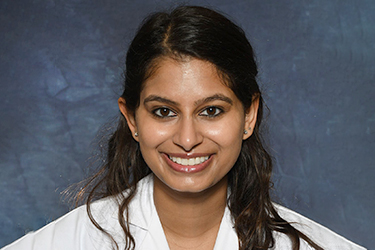By Natasha Mehra, MD (PGY-1)
 Nothing could have prepared me for my first patient’s death in residency. I had lost patients as a medical student, but it was different as a resident.
Nothing could have prepared me for my first patient’s death in residency. I had lost patients as a medical student, but it was different as a resident.
It was my first month, and I was learning how to be an intern. Mrs. P was one of my first patients, and I enjoyed visiting her room. She was a very blunt person, which usually led to me leaving her room feeling amused. She did not hide how much she hated the food and how she did not want to die in a hospital. I spent almost my entire month in the CCU taking care of her.
When she came in, she had a DNR/DNI order, but she had agreed to be emergently intubated because we thought the cause was reversible. We succeeded in extubating her a few days later, but it wasn’t long before she required the ventilator again. I struggled every day she remained intubated because I wanted to honor her original wishes. After multiple failed spontaneous breathing trials, I realized that coming off the ventilator would be very unlikely, and I had a very difficult time accepting her condition.
She came in for what we initially thought was a heart problem, but her workup had been negative. Now, she was intubated, barely responsive, and requiring pressors. During her hospitalization, I had been talking to her husband over the phone daily, sometimes multiple times a day. I shared that our team had many more questions than answers about Mrs. P’s case. He seemed to be taking everything very well. He knew how sick she was, and it didn’t matter to him that we couldn’t figure out why this was the case.
Ultimately, we had a goals of care discussion with Mr. P and Mrs. P’s two sisters. At this point, Mrs. P was unresponsive. Everyone agreed she would not wish to live on a machine while barely responsive. They made the decision to transition her to comfort care and palliatively extubate her. Logically, I knew this was the best scenario for Mrs. P. She had scleroderma and her lungs had been deteriorating, which is why she had opposed intubation. She knew her lungs would eventually fail and that a ventilator would only prolong her suffering. My heart still hurt though. I felt that I had failed her, failed her family, and myself. How could she have come into the hospital with concern for cardiogenic shock and end up in the Palliative and Comfort Care Unit with multiple failing organs, none of which were her heart? Was her scleroderma even related to any of what was happening? These questions plagued me.
When the day came for her to be transferred to the palliative care unit, her family wanted to speak with me. Much to my surprise, they were thankful for everything I had done. “I’m sorry we couldn’t fix her. I really thought we could,” was all I could manage to say. Her husband told my attending that they were glad that I was the one taking care of her because I was a “damn good doctor.”
Mrs. P and her family taught me a lot about the practice of medicine. As physicians many of us are used to being perfectionists, but diagnoses don’t always present like the textbooks. I expected Mrs. P and her family to be upset that we didn’t have many answers. Yet honesty and communication in their care was what they valued the most. They didn’t understand a lot of the complex diagnoses she had, but they appreciated that we were trying our best to make her comfortable. Their understanding and appreciation gave me the confidence to be kind to myself, to understand that sometimes patients come in so sick, no matter what you do, you cannot fix them. I wanted to hold myself personally responsible for not having answers for her condition. Her family did not. They knew scleroderma was a brutal disease that would take her away from them, even if I had not accepted it yet. They were grateful that we framed the discussion every day around her wishes. And when I came to the point of believing she wouldn’t come off the ventilator, they did not give it a second thought and believed me.
I still tear up when I think about her passing away. But I am grateful that it was while she held hands with her family in the palliative care unit. She went without a tube down her throat, as she wanted. She was not in any pain. She helped me realize that sometimes medicine is really hard and messy, and no one can have all the answers. She taught me that my most important duty as a physician isn’t always going to be to save the patient. My most important duty is to help my patients retain their dignity and honor their wishes, which may mean more than anything else.